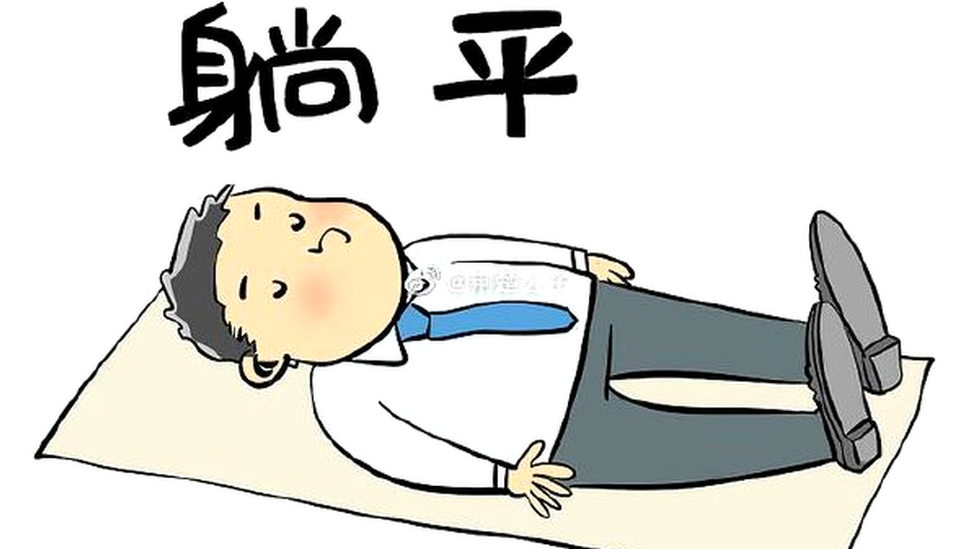In a dusty factory town in southern China, a man has spent the last ten years of his life waking up to the same alarm. He’s worked various hard factory jobs, and other odd jobs along the coast. His whole life he’s lived by the idea that hard work can change everything, that he should save each coin he earns, that through a 996 schedule (9am to 9pm 6 days a week) he can make his way to the top. But one day he decides to quit, and he rides his bicycle across China for months, living off of little money, but realizing he doesn’t need much, just enough eat and breathe and think freely.
This man returns home one day and decides to write a post online about it. He wants to stop measuring his worth by how much he can produce, and he refuses to be consumed by the endless competition in life.

“I can sleep in my room, I can eat simple food, I can do nothing. Lying flat is my wise man’s movement.”
The post was quickly deleted. You’d have a very difficult time trying to find a screenshot of it if you tried. Yet the man, Luo Huazhong, had helped spark a new way of thinking. It wasn’t a crazy public act or demonstration, just a quiet post from an unknown netizen.
It’s very much engrained in Chinese culture the idea that hard work creates success, and in particular in modern times, that hard work with academics will lead to success. You can see similar philosophies across the world and Asia, but the economic/political environment in China is unique and creates some friction with this.
In many ways, China’s economy is changing; social mobility is on the decline, income inequality is higher than ever, and the cost of living is going up. For younger people, pursuing college degrees and office jobs, the amount of available opportunities is far out-numbered by the vast number of people who have all been taught that this is the path to success. People who have spent years earning their degrees are being forced to return to their small hometowns without work, or to take on a manual labor job with a wasted degree.

These are just official statistics from the government, whose known to obfuscate numbers. The political climate is also the reason why you probably won’t find any public posts mentioning the term “躺平” (tǎng píng), as they are frequently scrubbed. But the economic reality for many Chinese people has meant that despite that, the term and way of thinking has become wildly popular. These days, excessive internet censorship from the government can often backfire, and people come up with new terms, or code references to ideas through images (high-tech example depicted to left).

To “躺平”, or “lie flat”, doesn’t mean to just give up. It’s about finding peace/value in small things. It’s about choosing your own path. It’s about not letting the system define your worth. It’s different from various other related phrases, like “摆烂” (let it rot), which is a more jaded and extreme attitude. “躺平” is a versatile term; it’s used in the context of workplace burnout, academic overload, job-searching frustration, and even against pressure from family/society to get married. For many, it’s a call to resist the status quo, and to seek our own forms of peace. For others it’s just a lighthearted word to use when things go wrong: “I think I’ve tried enough, might as well go lie flat.” It can even refer to relaxing or taking it easy in general; this cat bed advertisement tries to capitalize on positive associations with “lying flat”.


The core idea behind the term isn’t new though, in fact it might feel quite familiar from our class. An idea from Daoism, “无为” (wú wéi), closely mirrors the concept of “躺平”. Just like how Luo Huazhong said lying flat is wise, Laozi said it is wise to “Practice not-doing”. Wú wéi is about not forcing things, letting go of focused effort; the biggest difference between the two terms is just the more memeable and casual feel of “lie flat”. Similar circumstances in their respective time periods led them to come to similar conclusions. Perhaps Luo Huazhong was acquainted with Daoist ideas when he chose to quit his job, but that isn’t the case for every person practicing “躺平” today. It reminds me of dynastic cycles, with modern China and Laozi’s China undergoing similar transformations, and how an excess of one thing (achievement culture) creates a push in the opposite direction.

This balance of ideals is also seen in Yin vs Yang. Daoism as a whole is about finding balance, and Yin, representing yielding, passivity, letting things go, among other things, is required to balance out Yang. Lying flat in China today could be said to be balancing out the often monolithic culture of achievement that’s rooted in Confucian ideals. Yet the phrase is more than just a desire for a lifestyle; it’s a political message of young people rejecting their government’s attempts to shape their way of thinking. Maybe the Mandate of Heaven will run its course.


































